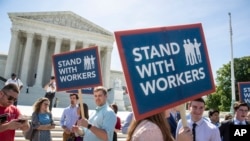In a blow to organized labor, the U.S. Supreme Court ruled Wednesday that unions representing public workers such as teachers and police officers may not charge non-members fees, cutting off a major source of revenue.
The decision Wednesday in Janus v. AFSCME overturned a 1977 ruling by the High Court, which originally permitted the "fair share fees." The court's conservative majority ruled the earlier decision, Abood v. Detroit Board of Education, violated non-union members' First Amendment rights, saying mandatory payments to unions constituted an endorsement of a political message that might contrast with their personal beliefs.
"Forcing free and independent individuals to endorse ideas they find objectionable raises serious First Amendment concerns," Justice Samuel Alito wrote in the court's majority opinion. All four liberal justices on the court dissented.
The ruling is seen as a major victory for conservative activists, who have long worked to curtail the power of public unions. Labor unions are a significant voting bloc for the Democratic Party.
"Supreme Court rules in favor of non-union workers who are now, as an example, able to support a candidate of his or her choice without having those who control the Union deciding for them," President Donald Trump tweeted Wednesday, following the decision. "Big loss for the coffers of the Democrats!"
The court was expected to strike down the Abood decision in 2016. Yet Justice Antonin Scalia, who was expected to vote against Abood, died suddenly after the case was argued — forcing a 4-4 deadlock.
U.S. Senate Republicans successfully filibustered then-President Barack Obama's nominee to replace Scalia, Merrick Garland. President Trump subsequently was able to appoint his own justice pick, Neil Gorsuch, who voted with the conservative majority in Wednesday's case.
The New York Times reported Wednesday this decision could cost public unions tens of millions of dollars. While the ruling does not affect private union workers, unions represent just 6.5 percent of employees within the private sector, the Times reported.
Patty Murray, the top Democrat on the U.S. Senate's labor committee, expressed disagreement with the court's ruling.
"Today's decision is a loss for working people and yet another win for corporate special interests that have spent decades funding political campaigns and lawsuits designed to chip away at workers' rights," Murray said in a statement. "For more than a century, unions have organized to lift up the voices of workers who were otherwise unheard, and fought for fair pay, safer working conditions, and better benefits."
Representative Donald Norcross, a New Jersey Democrat and member of the Congressional Progressive Caucus, attacked the court's claim that the Abood decision violated workers' First Amendment rights, and called the Janus decision a "dangerous precedent."
"If you applied this decision outside the scope of public unions, government would cease to function," Norcross said. "How many people would stop paying their taxes if we said the First Amendment allowed it?"
Norcross is a co-sponsor of the Workplace Democracy Act, introduced in Congress in May. The bill would eliminate right-to-work laws, which reduce the power of unions and are currently in effect in 28 states.
Representative Mark Pocan, a Wisconsin Democrat and a Progressive Caucus member who introduced the bill in the House of Representatives, said the decision was a "real blow" to the working class, but would not destroy public unions.










